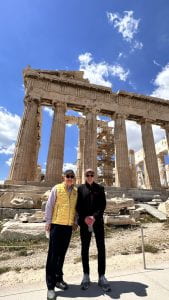On a whirlwind, one-week trip to Greece, USC President Emeritus C. L. Max Nikias delivered a stirring lecture, “Xenophon’s Cyropaedia: The Art and Adventure of Leadership,” at the University of Piraeus in Athens. Then with General David H. Petraeus, he attended the Delphi Economic Forum held near the ancient Temple of Delphi, site of the famous oracle.
While in Greece, he and Petraeus met with the U.S. Greek Ambassador, the Honorable George Tsunis, as well as a host distinguished Greek officials, business leaders and academics. Nikias, a native of Cyprus, discussed plans for summer programs for Cypriots at American universities with the Honorable Julie D. Fisher, U.S. ambassador to Cyprus.

The April 25th lecture was given under the auspices of the University of Piraeus Department of International and European Studies, and the Council for International Relations-Greece (CfIR-GR). It was followed by a panel discussion. Professor Athanassios Platias, dean of the School of Economic, Business and International Studies gave introductory remarks. On the panel were Melina Tamiolaki, University of Crete, and Aristotle Tziampiris and Konstantina Botsiou, both from University of Piraeus. Tziampiris is also president of CfIR-GR and Botsiou served as moderator of the lively discussion that followed the speech.
Nikias said Xenophon wrote Cyropaedia, or The Education of Cyrus, 2,400 years ago. It is an account of the life of the great Persian king, Cyrus, known as Cyrus the Great. “It tells the story of his lineage, his personality, character traits, education he received, his military campaigns and alliances, his conquest of Babylon in 539 BCE and the establishment of the ancient world’s first large empire,” Nikias said.
Nikias explained that Xenophon wrote Cyropaedia 165 years after Cyrus died so it would be “like writing about Ulysses Grant in our times.”
“Why did Xenophon pick Cyrus of Persia and not a Greek leader of antiquity?” Nikias asked. Answering his own question, he speculated that Xenophon wrote a historical novel portraying a prince as an ideal leader.
“He was writing about himself and his leadership experiences.” His masterpiece, now considered the “Bible on Leadership,” is fictional and not a true account of the life of Cyrus.

Cyropaedia, influenced Alexander the Great, Cicero, Machiavelli, the U.S. Founding Fathers and countless books and articles on leadership. The renowned leadership and management expert, Peter Drucker, called it the first systematic book on leadership and “still the best book on the subject. It is all in there.”
In a story about the lecture, the National Herald in Greece described Nikias as “something of a Renaissance Man as his academic achievements relate to both engineering and the humanities.” The paper said that he “emphasized both the challenges of leading/governing people and the continued salience of Xenophon’s ideas.”
Following the lecture, the University of Piraeus honored Nikias with the presentation of a rare silver coin of Themistocles commemorating the Greek victory at the Battle of Salamis 2,500 years ago.
Nikias said that the Delphi Economic Forum, which was held April 26–29, is “like a mini-Davos. It brings together thought leaders to address emerging challenges and promotes sustainable and socially responsible growth policies for Europe, especially the Eastern Mediterranean region and Greece.”
Finally, Nikias conducted Petraeus on a personal tour of the Acropolis and the Acropolis Museum.
“It was a true privilege to spend four and a half hours in and around the Acropolis, walking around the Parthenon and visiting the phenomenal Acropolis Museum,” Petraeus said. “Max has been a great friend and mentor since I began my six years as a Judge Widney Professor at USC in 2013. He is an exceptional scholar of both ancient Greece and cutting-edge technology.”
“All in all, a truly memorable visit to the cradle of democracy and civilization. Fight On!”